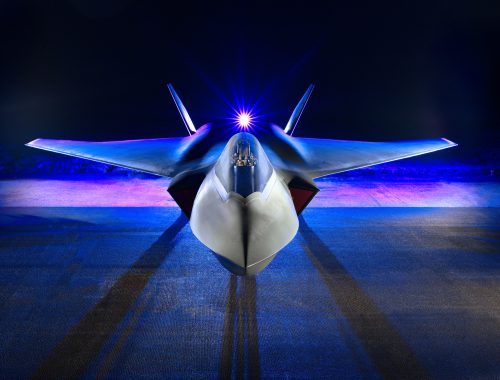Defence group reports strong Q1 trading as global tensions continue to escalate

Defence group, BAE Systems, has seen a “strong start” to its 2025 fiscal year, as global tensions continue to increase in military hotspots around the world.
The group delivered a trading update for the first quarter, ahead of its annual general meeting today, in which it said management expectations, so far, have been achieved.
Full year guidance is maintained, it said its order backlog and pipeline of work on incumbent positions provide good visibility and support long term growth, while it is well positioned to capture additional defence spending. The group is investing to support growth, it said.
CEO, Charles Woodburn, said: “We’ve had a strong start to 2025 and are maintaining our guidance for the full year.
“During this time where the defence and security landscape is rapidly evolving, we are focused on delivering our long term programme commitments to our customers, while investing in our business to boost capacity, drive efficiencies and shape our portfolio to support future growth.”
BAE Systems employs around 15,000 staff in the North West at its submarine yard in Barrow-in-Furness and its Warton and Samlesbury sites in Lancashire, and approximately 1,800 staff in the South West at sites in Bristol, Yeovil, Weymouth, Dorchester, New Malden, Frimley and Portsmouth.
Guidance for the full year, on a constant current basis, forecasts sales growth of between seven and nine per cent on 2024’s £28.3bn figure, and underlying EBIT of eight to ten per cent, compared with £3bn in 2024.
Order intake in the year so far include:
- Armored Multi-Purpose Vehicles – $356m award to procure long-lead material to support a definitised full rate production contract expected in the second half.
- ARCHER mobile howitzers and TRIDON Mk2 systems – artillery package approaching $300m in total including 18 ARCHERs, further TRIDON Mk2 systems and additional artillery location radar systems.
- Amphibious Combat Vehicles (ACV) – awarded two full-rate production contracts from the US Marine Corps totalling more than $360m for ACV-30mm vehicles, to include fielding support, spares and test equipment.
- Integration Support Contract (ISC) – Intelligence & Security received a nearly $800m contract in January to extend ISC services to the US Air Force with options through to July 2027.
- Canadian River-class Destroyer – contract for next phase of Canada’s River-class destroyer programme.
- MBDA – c£600m for various domestic and export awards.
The group said the regions in which it operates are poised for higher defence spending. It expects this to provide a robust set of further opportunities across all its sectors.
In response to the increased global security challenges, a number of European NATO members have announced significant increases in their defence budgets.
BAE Systems said it has a strong, established position in Europe and its range of products and services aligns well to the capability requirements of these nations. These include combat aircraft, combat vehicles, air defence, missile systems, artillery, munitions, drones, electronic warfare and sensor technology.
The UK Government has stated its commitment to increase defence spending to 2.5% of GDP from 2027. It has also identified defence as one of eight growth-driving sectors in its upcoming industrial strategy.
The group said it is actively engaged with the Government on its ongoing Strategic Defence Review and Defence Industrial Strategy, which will make recommendations on the nation’s future defence plan in the coming months.
In the US, a Continuing Resolution was passed in March to provide funding through the end of fiscal year 2025.
The new administration has said it intends to provide the country with unmatched military strength for years to come, a plan that calls for increased spending and a reprioritisation of where it is spent.
BAE’s portfolio is well-aligned with the key priorities of US and international defence and intelligence customers, including its capabilities in combat vehicles, electronic warfare programmes, precision guidance and missile defence systems, as well as space electronics, instruments and spacecraft.
In the face of the evolving tariff policy, BAE said it notes that the vast majority of equipment it delivers to its US customers is produced in its US operations with a largely domestic supply chain.
As such, it doesn’t expect to be materially impacted by the US tariffs, as they are currently proposed.
BAE’s key markets in Asia-Pacific and the Middle East are also expected to see higher defence spending, and the group will continue to support its government customers in these regions with leading products and services, it said.
The group said the 2024 final dividend of 20.6p per share will be paid, subject to shareholder approval, on June 2, 2025.
As at May 6, BAE had completed £392m of the three-year up to £1.5bn share buyback programme, which commenced in July 2024.
Half year results will be announced on July 30, 2025.
Russ Mould, investment director at Manchester investment platform, AJ Bell, said: “BAE Systems is a rare beast on the UK stock market in that it is one of the few companies not to be derailed by tariff and economic turmoil.
“Governments in many parts of the world have pledged to increase defence spending, thereby creating a richer backdrop for BAE to bid for contracts.
“Most of the equipment delivered to US customers is made domestically with parts mostly sourced from American suppliers, so tariffs aren’t applicable in these cases.
“Trading is ticking along as expected and there is no change to earnings guidance. It intends to hire more people, including the training of many individuals to create tomorrow’s skilled workforce.”
He added: “The key question now is whether this bounty of good news is already priced into the stock.
“The shares haven’t budged on the latest reassuring trading update and euphoria around the defence sector’s earnings growth opportunities has been in motion for some time.
“BAE arguably needs more earnings upgrades to keep driving the share price higher, and that means it needs to win as many contracts as it can as tenders come up.”








